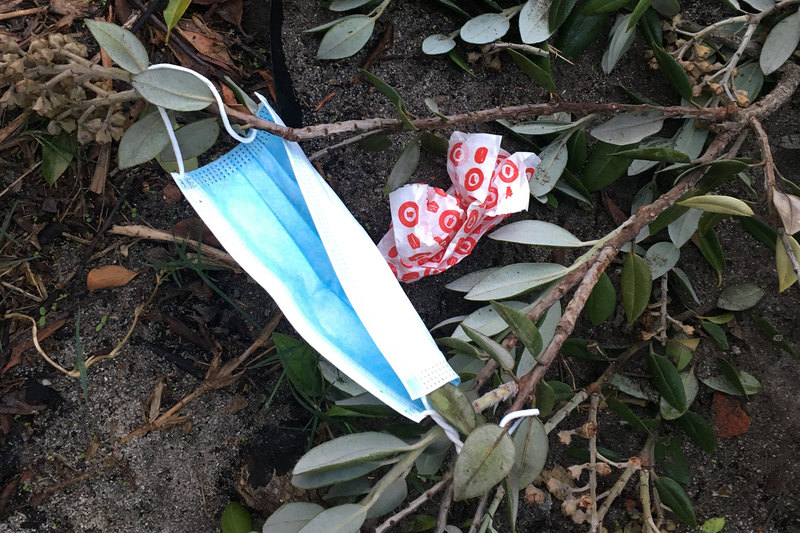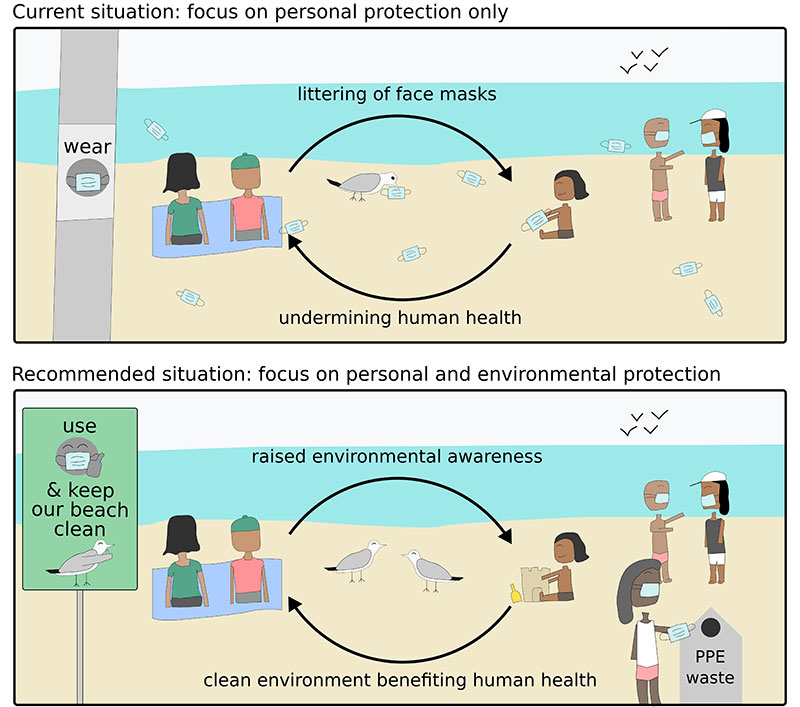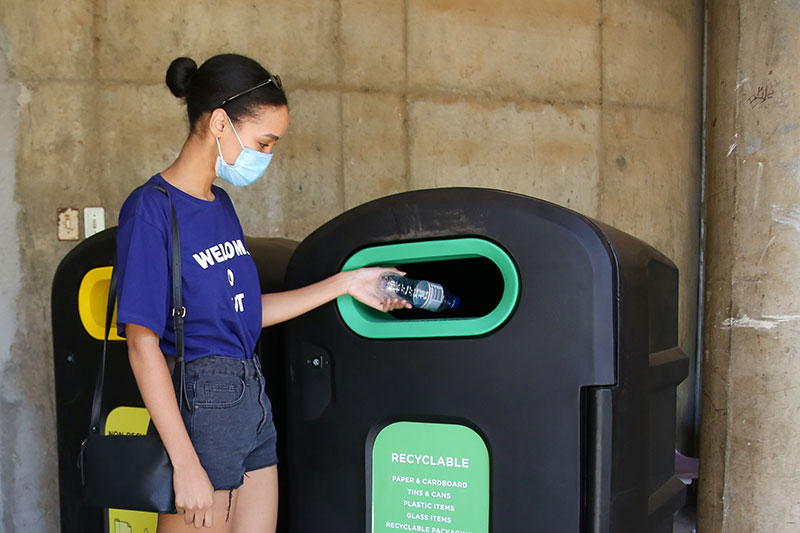Help reduce the impact of disposable face masks on the environment
13 May 2021 | Story Carla Bernardo. Read time 4 min.
Since the onset of the COVID-19 pandemic, with the mandatory use of face masks, there has been a massive increase in the number of disposable face masks entering South Africa’s waste stream, while many still are left scattered around.
The University of Cape Town’s (UCT) director of Environmental Sustainability, Manfred Braune, and the institution’s environmental management committee are calling on the campus community and the broader public to discard their disposable face masks responsibly.
“Many of the face masks are littered across precious natural resources such as rivers, beaches and oceans, causing harm to our fauna and flora. [This includes] the elastic bands fixed to the face masks, which all kinds of creatures are getting caught up in,” said Braune.
“While the requirement of mask-wearing is mandated, and there is significant fear of infection, there seems to be very little regard [for] the harmful environmental impact these disposable face masks [have] on our natural systems.”
Reducing impact
Concerns about the harmful effects of disposable face masks on the environment are echoed in a recently published research paper by the Universidad Católica del Norte’s Professor Martin Thiel, a collaborator of the FitzPatrick Institute of African Ornithology’s director, Professor Peter Ryan.
The research paper looked at the high volumes of disposable face masks that were found on a beach in Chile during the lockdown period. Recommendations from the paper include providing sufficient signs and waste bins for the disposal of personal protective equipment (PPE), establishing general and strict waste disposal regulations, and improving enforcement. The authors recommend that educational campaigns be aimed at proper use and disposal of face masks, litter prevention, reduction of single-use waste, and enhanced pro-environmental behaviours.

In addition to these campaigns, Braune has a few suggestions on how individuals can play their part in reducing the negative impact of disposable masks on the environment:
- Only wear disposable face masks when you must. Otherwise, always wear a cloth face mask that can be washed and reused (this may be different for healthcare workers, who typically must wear what is prescribed for them – which may include disposable masks).
- Cut the rubber band on both sides of a disposable mask before disposing of it.
- Make sure the face masks end up in a dustbin, and nowhere else.
- Where you can, safely pick up and dispose of any face masks that you find littering your environment.
- Create awareness of these environmental issues related to masks among colleagues, friends and family.
Make a difference
Braune added that while it is hoped that face masks will soon be a thing of the past, action is needed now to reduce the harmful impact this additional litter is having on the environment.
He reiterated UCT’s commitment to environmental sustainability and reminded the campus community about the university’s recently installed bins.

“UCT provides waste bins all across campus and in residences, and we ask the UCT community to act in unity – not only to protect ourselves from COVID-19, but also to protect our environment by using and responsibly disposing of face masks.
“Together, we can make a huge difference,” said Braune.
 This work is licensed under a Creative Commons Attribution-NoDerivatives 4.0 International License.
This work is licensed under a Creative Commons Attribution-NoDerivatives 4.0 International License.
Please view the republishing articles page for more information.
UCT’s response to COVID-19
COVID-19 is a global pandemic that caused President Cyril Ramaphosa to declare a national disaster in South Africa on 15 March 2020 and to implement a national lockdown from 26 March 2020. UCT is taking the threat of infection in our university community extremely seriously, and this page will be updated with the latest COVID-19 information. Please note that the information on this page is subject to change depending on current lockdown regulations.
Minister of Health, Dr Joe Phaahla, has in June 2022 repealed some of South Africa’s remaining COVID-19 regulations: namely, sections 16A, 16B and 16C of the Regulations Relating to the Surveillance and the Control of Notifiable Medical Conditions under the National Health Act. We are now no longer required to wear masks or limit gatherings. Venue restrictions and checks for travellers coming into South Africa have now also been removed.
Read the latest document available on the UCT policies web page.
Campus communications
2022
UCT Community of Hope Vaccination Centre
On Wednesday, 20 July, staff from the University of Cape Town’s (UCT) Faculty of Health Sciences came together with representatives from the Western Cape Government at the UCT Community of Hope Vaccination Centre at Forest Hill Residence to acknowledge the centre’s significance in the fight against COVID-19 and to thank its staff for their contributions. The centre opened on 1 September 2021 with the aim of providing quality vaccination services to UCT staff, students and the nearby communities, as well as to create an opportunity for medical students from the Faculty of Health Sciences to gain practical public health skills. The vaccination centre ceased operations on Friday, 29 July 2022.
With the closure of the UCT Community of Hope Vaccination Centre, if you still require access to a COVID-19 vaccination site please visit the CovidComms SA website to find an alternative.
“After almost a year of operation, the University of Cape Town’s (UCT) Community of Hope Vaccination Centre, located at the Forest Hill residence complex in Mowbray, will close on Friday, 29 July 2022. I am extremely grateful and proud of all staff, students and everyone involved in this important project.”
– Vice-Chancellor Prof Mamokgethi PhakengWith the closure of the UCT Community of Hope Vaccination Centre, if you still require access to a COVID-19 vaccination site please visit the CovidComms SA website to find an alternative.
Frequently asked questions
Global Citizen Asks: Are COVID-19 Vaccines Safe & Effective?
UCT’s Institute of Infectious Disease and Molecular Medicine (IDM) collaborated with Global Citizen, speaking to trusted experts to dispel vaccine misinformation.
If you have further questions about the COVID-19 vaccine check out the FAQ produced by the Desmond Tutu Health Foundation (DTHF). The DTHF has developed a dedicated chat function where you can ask your vaccine-related questions on the bottom right hand corner of the website.
IDM YouTube channel | IDM website
“As a contact university, we look forward to readjusting our undergraduate and postgraduate programmes in 2023 as the COVID-19 regulations have been repealed.”
– Prof Harsha Kathard, Acting Deputy Vice-Chancellor: Teaching and Learning
We are continuing to monitor the situation and we will be updating the UCT community regularly – as and when there are further updates. If you are concerned or need more information, students can contact the Student Wellness Service on 021 650 5620 or 021 650 1271 (after hours), while staff can contact 021 650 5685.




















